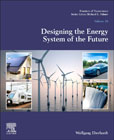
Nanoscience for Energy Systems: Efficiency Challenges and Future Opportunities
Eberhardt, Wolfgang
The secure, sustainable and affordable supply of energy in the face of a growing population and increasing demand is one of the grand challenges and basic needs of our society. This has to include all aspects of generation (conversion) transport, storage and efficient utilization of energy. In the past decade, there global drive to rebuild the energy system, as manifested by the climate accord achieved in Paris in 2015, which almost all countries of the world are participating in. While the drive for this change is global, the solutions for each country will have to be individualized depending on the geography and available energy resources. In general however the move is towards de-carbonization of the energy system, i.e. to abandon or replace most of the fossil sources of energy by renewable ones. Nanotechnology, and the use of nanomaterial in particular, play a key role in these solutions. Nanoscience for the Energy System explores how nanotechnology is being used to solve important energy challenges. These include the creation of new technology for transport systems and the generation of chemical fuels without increasing the CO2 content in the atmosphere is another aspect of this challenge. Nanoscience is at the heart of many of these processes and solutions, includingfuel cells, batteries, hydrogen storage, photocatalytic water splitting, advanced materials for solar cells and also the role of aerosols in cloud formation and pollution. Outlines how nanotechnology advances are at the core of creating a secure, sustainable and affordable supply of energy worldwideExplores how the unique properties of nanomaterials make them highly suitable for applications in energy system designDiscusses the major challenges in creating a globally efficient energy system and suggests how nanotechnology can provide solutions INDICE: 1. Introduction - A vision of the Energy System of the Future2. Fuel cells for the transportation sector:3. Nanoparticle concepts for photovoltaics:4. Dye sensitized nanostructured cells for photovoltaics:5. Nanoparticles for Hydrogen Storage materials6. Nanoparticle concepts for battery applications7. Photocatalytic water splitting8. Catalysis and Energy9. Nanoparticles in wall coverings for thermal stabilization10. Electrochrome window materials11. Nanoparticles in Atmospheric Chemistry and Climate Engineering
- ISBN: 978-0-08-102513-0
- Editorial: Elsevier
- Encuadernacion: Rústica
- Páginas: 500
- Fecha Publicación: 01/09/2019
- Nº Volúmenes: 1
- Idioma: Inglés
